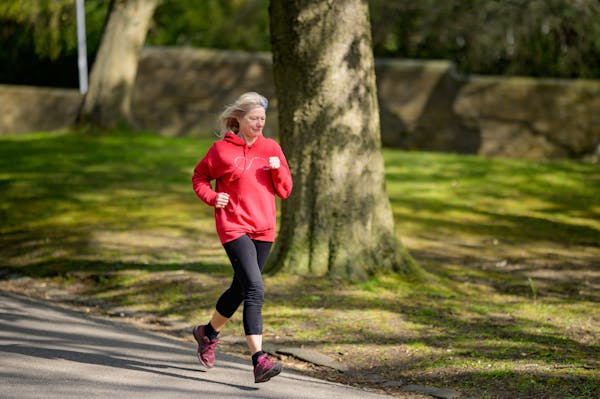
Coping up with runners every time you exercise with friends is a struggle, especially if you are not a runner or simply a beginner. Hence, if you are not into running, you can jog around the neighborhood at your most convenient time, even alone. Jogging is known to have the same benefits as running towards our overall health, and this article will tackle the life-changing benefits of jogging exercise itself.
What is Jogging?
Jogging is considered an aerobic exercise. Jogging typically refers to running slower than 6 miles per hour (mph), offering numerous health benefits for individuals seeking to enhance their well-being without pushing themselves too hard.
What are the Benefits of Jogging Exercise?
-
Jogging towards Mental Health:
Enhances Cognitive Abilities
Engaging in slow jogging and moderate aerobic exercises is a reliable strategy against mental fatigue. Studies have demonstrated that consistent participation in slow, steady aerobic activities can enhance neuroplasticity and guard against neurodegeneration. Many Stoic athletes attest that daily exercise significantly improves focus and decision-making abilities.
While jogging may feel routine, it serves as excellent brain food. Consistent jogging sessions contribute to the enlargement of your hippocampus, a brain region crucial for memory functions. Moreover, jogging may slow the hippocampal shrinkage associated with aging-related memory decline.
Aerobic exercise’s impact on brain health and behavior occurs swiftly, prompting medical practitioners to recommend it for preventing, delaying, or addressing cognitive decline.
Enhancing Potential Creativity
Jogging offers a unique avenue for gaining clarity and daily inspiration.
It is an effective method to overcome writer’s block or navigate new challenges, hence the increasing trend of the lunch run. Only by liberating ourselves from high-pressure environments and allowing our thoughts to meander can we tap into our finest ideas. Nature provides an abundance of visual stimuli during these moments.
Many of us have experienced that breakthrough during a lunch run or while in the shower, away from the constraints of the office. Our subconscious mind has diligently sought that breakthrough idea or solution, waiting for the moment to present it to our conscious awareness.
Studies indicate a remarkable 60% surge in creative output during solitary exercise. Furthermore, engaging in outdoor activities matters significantly: 100% of individuals who exercised outside generated at least one innovative, high-quality idea, compared to only 50% of those who remained indoors.
-
Jogging towards Emotional Health:
Reduces Stress, Depression, and Anxiety
Engaging in physical activity isn’t just beneficial for your body; it’s also nurturing for your mind. Simply lacing up your running shoes and venturing into nature transports you to a realm of happiness that might otherwise remain inaccessible. You’ll alleviate stress, depression, and anxiety, breathe in fresh air, and solve problems more efficiently than ever. The day’s burdens will dissipate effortlessly.
Moreover, the rejuvenating mental health advantages of your jogging sessions can linger long after your body has physically recovered.

Boosts Mood
Engaging in physical activity is not just beneficial for your body; it also nurtures your mind.
When you consistently lace up your running shoes and venture into nature, you transport yourself to a realm of otherwise inaccessible happiness. This practice helps diminish stress, depression, and anxiety while allowing you to breathe in more fresh air and tackle challenges with heightened efficiency. The day’s burdens effortlessly fade away.
Moreover, the revitalizing mental health advantages of jogging can linger long after your physical recovery, leaving you with a lasting sense of well-being.
Increases Energy Levels
The paradox of jogging lies in its ability to increase energy levels and foster a commitment to a healthy lifestyle with each session. Furthermore, jogging promotes faster sleep onset and enhances sleep quality, leading to a range of benefits, including improved mood, productivity, presence, engagement, stamina, weight loss facilitation, and overall health enhancement.
Connects with Nature
Road running is typical for many of us—it’s accessible, convenient, and can be done anytime, anywhere. Yet, it may grow tedious with time.
Integrating trail running into your training regimen can offer a refreshing connection with nature and add excitement to your runs.
Utilizing running apps like Strava can be incredibly beneficial for discovering new routes in your area. With millions of athletes worldwide, Strava boasts the largest database of road and trail running routes. If a route has been run before, you’ll likely find it on Strava. The platform, often called the “social network for athletes,” offers gamified features and encourages user interaction through kudos and cheers. I’ve found the supportive community on Strava to be a fantastic source of motivation.
-
Jogging towards Physical Health:
Enhances Cardiovascular Health
Physical activities like jogging greatly benefit your cardiovascular health, regardless of distance or speed. This includes the well-being of your heart and blood vessels.
Builds Stamina & Endurance
While stamina is essential for sprinting events, longer distances require endurance. However, building endurance involves discipline and patience. It can take 4-6 weeks of regular exercise to notice changes in your aerobic ability and to feel the actual training benefit.
Incorporating more challenging trail terrain into your training regimen can strengthen your leg muscles and enhance your VO2 capacity, benefit your participation in flatter road running races.
Enhances Respiratory Efficiency
During running, your muscles and cells rely on a consistent oxygen supply and carbon dioxide removal to support movement. Effective breathing is crucial for optimal muscular performance, including the diaphragm, stabilizing your core for improved running posture, and regulating your nervous system to manage stress effectively.
Incorporating exercises that target the diaphragm and promote proper breathing techniques can elevate your oxygen intake while jogging.
Strengthens Lower-Body Muscles
While your upper body muscles may not receive as much attention, jogging significantly benefits your lower body. Running engages various leg muscles crucial for speed and technique.
The gastrocnemius and soleus muscles in the calves play a pivotal role in lifting the heel and propelling you forward. Additionally, the quads and gluteal muscles stabilize your pelvis, particularly during the float phase when both feet are off the ground.
Your quadriceps and key thigh muscles determine your stride and ability to navigate uphill terrain, while the hamstrings facilitate force generation during push-off phases. Furthermore, running engages core muscles like the obliques and rectus abdominis, stabilizing the lumbar spine and reducing compressive forces.
However, the repetitive nature of jogging can strain these muscles, underscoring the importance of strengthening and stretching exercises before and after each run to prevent injury.
Loses Belly Fat and Weight
A 30-minute jog ignites your metabolism and torches 200 to 500 calories. This progress is a remarkable stride toward achieving weight loss objectives. Jogging is highly effective for comprehensive weight management with a nutritious diet.
Furthermore, as the intensity increases, calorie expenditure escalates—up to an additional ten calories per minute per mile.
Boosts Immune System
There’s a misconception that regular exercise weakens your immune system and makes you more susceptible to illness, but this isn’t the case with moderate exercise.
According to research published in Immunology, engaging in frequent exercise (1-5 days per week) enhances your body’s ability to fight illnesses and viral infections. Another study in the British Medical Journal found that jogging can reduce the risk of colds and other respiratory diseases by up to 50%. Moreover, individuals who exercised regularly experienced 32-41% less severe upper respiratory symptoms than those who rarely exercised.
Keeping your workout sessions to 60 minutes or less is recommended for optimal immune-boosting benefits. Consistency is also crucial. Engaging in moderate daily exercise strengthens your immune and metabolic systems and builds upon previous gains, thus preventing regression.
So, lace up your jogging shoes and let the numerous health benefits of jogging come your way!
Promotes Faster Recovery
Engaging in active recovery jogging can expedite recovery after intense exercise sessions or long-distance runs, which may lead to delayed onset muscle soreness (DOMS). This stiffness can be debilitating for several days following training. Active recovery involves a gentle jog at 30-60% of your maximum heart rate, which helps alleviate muscle soreness and promotes faster recovery.
Adds Years to Life
The Copenhagen City Heart Study (CCHS) researched the impact of sports participation on life expectancy, revealing that adopting a sporty lifestyle could extend life by up to 10 years.
Over up to 25 years, the study followed 8577 participants until their demise, finding that engagement in various sports correlated with increased longevity. Specifically, jogging was associated with an additional three years of life. Moreover, sports that involved social interaction reported even more promising results, highlighting the benefits of joining a local running club or similar social sports groups.
What are the Potential Side Effects of Daily Jogging?
Caution:
Jogging has the potential to develop into an addictive habit, and the repetitive impact experienced from daily jogging could lead to strain on your lower-body muscles and joints. Rest days are recommended to alleviate stress on your body and prevent prolonged fatigue.
A thorough warm-up and cool-down routine are crucial for injury prevention. Additionally, diversifying your physical activities can help work different muscle groups and reduce the risk of overuse injuries. Incorporating lower-impact cardio exercises like swimming and using cross-trainers can help build muscle and endurance to support your running regimen. Alternating between road and trail running can also minimize the likelihood of developing stress-related injuries.
Ensuring adequate hydration and proper nutrition before, during, and after your runs is also essential for optimal performance and recovery.
Conclusion:
Jogging exercise benefits our mental, emotional, and physical health. To savor the life-changing benefits of jogging, start or end your day doing it. But before doing the exercise, consult your doctor for health purposes and follow the procedures and limitations given.













